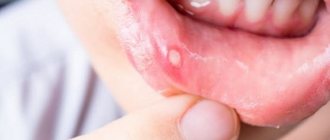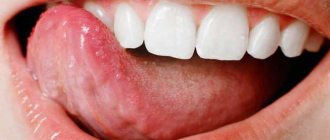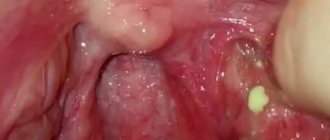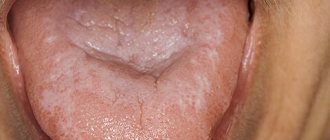Symptoms
Bitterness in the mouth can manifest itself in different ways, for example:
- after overeating and eating certain foods - indicates the reflux of bile into the esophagus and diseases of the bile ducts,
- aftertaste after taking medications means a disruption of the normal microflora, a negative effect on the liver and the destruction of beneficial bacteria,
- after sports training - speaks of liver pathologies.
Bitterness can occur at different times of the day, after physical activity and during the abuse of bad habits. Often the symptom is accompanied by nausea and vomiting, dizziness, heaviness in the side and abdominal pain, white coating on the tongue and a feeling of bloating, heartburn and belching, dry mouth. At the appointment, you need to inform the doctor in detail about each sign.
What to do if you have a bitter taste in your mouth and a white coating on your tongue
Some medications cause a bitter taste. These include lithium preparations, antidepressants, antibiotics, allopurinol, vitamin and mineral complexes. Bitterness in the mouth can be combined with nausea, dryness, and a white coating on the tongue. Usually, special treatment for bitterness in the mouth after taking antibiotics or other medications is not required. The unpleasant taste disappears upon completion of the course of treatment and no longer bothers you.
What should you do if you have a bitter taste in your mouth and a white coating on your tongue that persists for a long time after taking medications? Contact your doctor. It may be necessary to prescribe hepatoprotectors - drugs that restore liver function. The treatment regimen for some diseases initially includes medications that “protect” the liver. This approach is practiced when prescribing chemotherapy drugs, especially with long courses and high dosages.
Which doctor treats bitterness in the mouth?
First of all, bitterness in the mouth is considered as a symptom of gastroenterological disorders, so when the first signs appear, you need to make an appointment with a gastroenterologist.
To make an appointment with a doctor, choose any method:
- call the clinic +7 (495) 103-99-55,
- order a call back,
- leave a request for an appointment using a convenient form on the website:
Often people do not pay attention to bitterness in the mouth, explaining the occurrence of the symptom with overeating, an uncomfortable position in bed and some other reasons.
IMPORTANT! Rarely does anyone think that bitterness in the mouth is a signal indicating the development of serious pathology of the liver and gastrointestinal tract.
If you have been experiencing this symptom for a long time, do not engage in self-diagnosis and self-medication - make an appointment with a specialist at the Kuntsevo Treatment and Rehabilitation Center! An experienced gastroenterologist will collect anamnesis, complaints, conduct an objective examination, and refer you for laboratory and instrumental diagnostics to understand the cause of the pathology.
SIGN UP
It's all about the bile
How does bitterness in the mouth occur after eating? Thanks to the functioning of the liver, fats are broken down into food components that are easily digested. In this case, bile is released into the duct and emulsifies fats into particles. In cases of pathological processes, bile stagnates in the canal and is released into the esophagus. Bile also accumulates in the gallbladder. Due to this, a bitter taste appears in the mouth.
The cause of bile stagnation can be various diseases of the gastrointestinal tract, including inflammatory and infectious ones. In this case, bile enters the gastrointestinal canal in an amount that is not enough for the complete processing of all food.
Also, in this case, intestinal motility disorders occur, and as a result, stagnation of the digestive process. Undigested food is retained in the intestines, and rotting processes begin - this causes changes in taste sensations and the appearance of a bitter taste. A bitter taste in the mouth after eating food can be a symptom of the following diseases:
- Cholecystitis
- Jaundice
- Pancreatitis
- Colitis
- Gastroesophageal reflux disease
- Dyskenesia
Cholecystitis
Cholecystitis is an inflammation of the gallbladder. This disease is accompanied by bitterness in the mouth, heartburn, pain in the right side, and dry mouth. During the acute form of the disease, the temperature rises and vomiting, stool disturbances and the formation of a white coating on the tongue are possible.
Gastroesophageal reflux disease
Bitterness in the mouth after eating as an alarm signal
During this disease, there is an active release of gastric juice into the esophagus, sometimes so intensely that it reaches the esophagus and mouth. Therefore, it is not surprising to feel bitterness after eating. Such emissions usually occur due to overeating, abuse of fatty and fried or spicy foods.
Treatment methods
Basically, the treatment of bitterness in the mouth comes down to taking medications. The specialist selects complex therapy based on the results of tests and instrumental examinations. The gastroenterologist identifies one of three problems:
- Liver disorders. Means are prescribed to stabilize the operation of the “filter”,
- Digestive tract dysfunction. Drugs that affect the digestive system normalize the work
- Uncontrolled bile production. Eliminated by drugs that affect the level of secretion, for example, anticholinergics.
Herbal therapy
Treatment of bitterness in the mouth is possible with the help of medicinal plants. The most popular recipes.
| Main Ingredient | Preparation | Use |
| Calendula |
| Divide the entire volume of medication received into 5 doses. Drink the product throughout the day |
| Burnet |
| Drink half a cup 4 times a day |
| Herbal collection |
| Rinse your mouth with the medicine 2-3 times a day during the day when a bitter taste appears in your mouth. This ancient recipe is considered one of the most effective |
| Berry picking |
| This tea is supposed to replace regular tea. |
| Birch buds |
| Rinse your mouth with the resulting liquid for 5 minutes each time an unpleasant symptom appears. |
| Immortelle |
| Take a third of a cup half an hour before meals |
| Dandelion |
| Drink a quarter cup 3 times a day before meals |
| Corn silk |
| Divide the entire amount of product into 4 servings to drink throughout the day. |
Read also: Beneficial properties of dogwood for the human body
You can also mix honey, ground raspberries and a pulp of young aloe leaves in equal proportions. Then you need to take this remedy 1 tbsp. l. three times a day. This homemade medicine can be stored in the refrigerator for no more than 2 days.
Why do we need to treat bitterness in the mouth?
Since an unpleasant taste in the mouth is a symptom of some pathology, a comprehensive examination is needed, without which it is impossible to establish a diagnosis. Our clinic has the latest equipment for ultrasound diagnostics of the liver and gallbladder, gastroscopy, etc., which help identify the pathological process in a short time. Our own laboratory allows you to get test results within a few hours. It is the quick examination process that attracts many Moscow residents to our clinic, as well as experienced, qualified staff ready to help every patient.
2. Reasons
Even a non-specialist in the vast majority of cases associates a bitter taste in the mouth with a pathological state of the digestive system, more precisely, the liver and/or biliary tract. Indeed, the biochemical and physiological evolution of higher mammals has led to a strange paradox. As you know, bile produced by the liver is absolutely necessary for the digestion of food, be it the simplest food or exquisite delicacies. But at the same time, bile itself has a sharp unpleasant odor and an unbearably bitter taste, so normally it goes directly into the intestines (starting from the duodenum) and does not come into contact with the taste buds of the oral cavity. However, in a number of abnormal or clearly pathological conditions and processes, bile stagnates, is thrown into the stomach and esophagus, its taste is felt in the mouth - in a word, that same bitterness appears. In some cases, this may be associated with the consumption of too fatty foods or simply with banal overeating (the bitterness disappears as the body copes with the overload), in others it serves as one of the diagnostically significant signs of a serious gastroenterological disease. Thus, the most likely groups of causes of bitterness in the mouth are:
- diseases and any congestion in the biliary (bile) system, i.e. all kinds of dyskinesias, anomalies or pathologies of the bile ducts, cholelithiasis, pathology of the gallbladder, etc.;
- liver diseases: hepatitis, oncopathology, cirrhosis, etc.;
- diseases of the gastrointestinal tract with reflux syndrome (reflux into the esophagus): gastritis, gastroduodenitis, cancer of the pancreas and other gastrointestinal organs.
However, the above reasons, with all their diversity and, indeed, the greatest probability, do not exhaust the list of possible sources of bitterness in the mouth. You should also add to it:
- allergic reactions (in particular to dental materials);
- chemical intoxication, incl. taking certain groups of medications with hepatotropic side effects;
- inflammatory processes (especially with a purulent component) in the oral cavity;
- the presence of worms;
- endocrine disorders;
- infections;
- dysbacteriosis;
- hormonal changes associated with gestation (pregnancy) or menopause;
- deficiency or imbalance of a number of microelements necessary for the body (B vitamins, zinc, etc.);
- smoking (the more cigarettes smoked per day, the more stable and intense the bitter taste in the mouth and lips), as well as withdrawal symptoms when quitting smoking, which can be controlled with a special diet and vitamin therapy;
- alcohol consumption;
- abnormal mental states (depression, chronic stress, etc.).
Visit our Gastroenterology page
Diagnostics
If you have bitterness in your mouth, you need to go to a gastroenterologist to find out the reasons. To diagnose gastrointestinal diseases, if any are suspected, gastroscopy is performed. This is an examination of the gastric mucosa, which is done with a probe with an optical device at the end. With the help of gastroscopy, you can not only detect inflammation, but also take the affected stomach tissue for later examination.
In some cases, the doctor prescribes an ultrasound examination for diagnosis. But an x-ray of the stomach is considered a more informative diagnostic method. It is also possible to conduct laboratory diagnostics and biochemical blood tests if the doctor discovers indications for these procedures.











